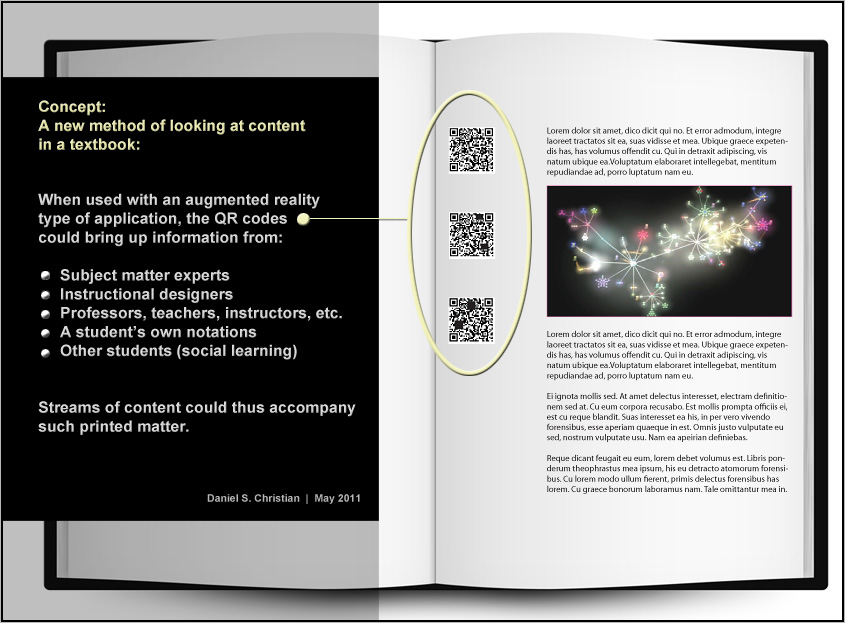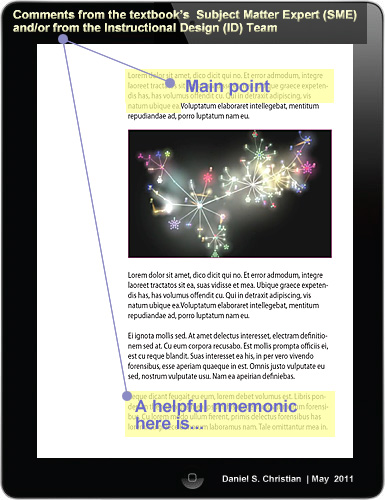From DSC:
Taking this concept into learning spaces…I would like to see this type of thing in all Smart Classrooms; for example:

Also see:
- Send your Handwritten Notes to Google Docs with Livescribe — from Digital Inspiration by Amit Agarwal




From DSC:
Taking this concept into learning spaces…I would like to see this type of thing in all Smart Classrooms; for example:

Also see:
[Concept] The new “textbook”: A multi-layered approach — from Daniel S. Christian
I’ve been thinking recently about new approaches to relaying — and engaging with — content in a “textbook”.
For a physical textbook
When opening up a physical textbook to a particular page, QR-like codes would be printed on the physical pages of the textbook. With the advent of augmented reality, such a mechanism would open up some new possibilities to interact with content for that page. For example, some overall characteristics about this new, layered approach:

For an electronic-based textbook


Advantages of this concept/model:
Addendum (5/26):
The definition of metacognitive skills in education — ehow.com by Gilbert Manda
Excerpt:
Controlling your thinking processes and becoming more aware of your learning is called metacognition. Metacognitive skills make you aware of your own knowledge, the ability to understand, control and manipulate your own cognitive process. In short, you learn to learn. It is important to know the process of learning and understanding your own approach to it.
From DSC:
I wish that scholars would write their articles/research findings up in two formats:
1) One format being targeted to other scholars/researchers
and
2) The second format being targeted to those folks outside academia who might benefit from it
This article is not from a scholarly journal, but it references some scholarly sources such as those from Purdue University and Midwestern State University; however, it is much more readable and useful to me — and probably to many others. It is written in language that more people can understand and work with. Academia needs to start being more relevant like this — speaking to audiences outside ourselves; especially when we are asking them to pay many of the bills.
How can we help students develop better metacognitive skills? What strategies can we offer while they are studying a particular lesson?
Metacognition: A Literature Review Research Report — from Pearson by Emily Lai, April 2011
Abstract
Metacognition is defined most simply as “thinking about thinking.” Metacognition consists of two components: knowledge and regulation. Metacognitive knowledge includes knowledge about oneself as a learner and the factors that might impact performance, knowledge about strategies, and knowledge about when and why to use strategies. Metacognitive regulation is the monitoring of one’s cognition and includes planning activities, awareness of comprehension and task performance, and evaluation of the efficacy of monitoring processes and strategies. Recent research suggests that young children are capable of rudimentary forms of metacognitive thought, particularly after the age of 3. Although individual developmental models vary, most postulate massive improvements in metacognition during the first 6 years of life. Metacognition also improves with appropriate instruction, with empirical evidence supporting the notion that students can be taught to reflect on their own thinking. Assessment of metacognition is challenging for a number of reasons: (a) metacognition is a complex construct; (b) it is not directly observable; (c) it may be confounded with both verbal ability and working memory capacity; and (d) existing measures tend to be narrow in focus and decontextualized from in-school learning. Recommendations for teaching and assessing metacognition are made.
Keywords: metacognition, self-regulated learning
From DSC:
Also see Chapter 12 of:
…which has excellent further resources, additional literature reviews, learning strategies.
MBA Curriculum Changes: Wharton, Yale, and Stanford Lead the Pack — from knewton.com by Christina Yu
Excerpt (citing article from a U.S. News article):
“Rather than consider pre-digested summaries of company situations, students tackle ‘raw cases’ packed with original data. Instead of being presented with an income statement, for example, they must mine the considerably bulkier annual filing to the Securities and Exchange Commission for data. The raw cases ‘push us to understand,’ says second-year Yale student Jason Hill. ‘They purposely put in more material than you could ever look at, but you have to learn where to look.’” (emphasis DSC)
From DSC:
I found this to be a good, interesting post. I just had a couple of thoughts that I wanted to throw out there re: it.
In looking at trends from an 80,000-foot level, I’d vote for MBA programs integrating much more of the tech-know-how — and/or appreciation of what technologies can bring to the table — as well as teaching grad students about some of the tools/technologies that are emerging these days (and I’d bet that the leaders/schools mentioned in this article are already doing this) .
I remember an instructor years ago — at SFSU’s MSP Program — saying that bots and agents will be the key to making decisions in the future, as there will be too much information for a person to sift through. The streams of content need to be tapped — but in efficient ways. So perhaps the logical step here is for MBA students to learn what bots/agents are, how to use them, and what their applications might be in making business/strategic decisions.
The most successful organizations of the future will be well-versed in technologies and what the applications/benefits of these technologies are. My bet? If you don’t have a technologist at the power table of your organization, the outlook doesn’t look very bright for your organization in terms of surviving and thriving in the future. Organizations will also need to be willing to take risks and move forward without having a full cost-benefit analysis done — as many times these don’t work well or are not even possible when implementing tech-based endeavors/visions.
Also relevant here:
Toward a science of learning — from InsideHigherEd.com by Diana Chapman Walsh
In travels around the country, I’ve been seeing signs of a trend in higher education that could have profound implications: a growing interest in learning about learning. At colleges and universities that are solidly grounded in a commitment to teaching, groups of creative faculty are mobilizing around learning as a collective, and intriguing, intellectual inquiry.
This trend embraces the advances being made in the cognitive sciences and the study of consciousness. It resides in the fast-moving world of changing information technology and social media. It recognizes and builds upon new pedagogies and evolving theories of multiple ways of knowing and learning. It encompasses but transcends the evolution of new and better measures of student learning outcomes.
…
I know that this essay is loaded with fighting words. But I believe we need, and are now beginning to see, ways to reframe the problem of learning outcomes, ways that might galvanize positive energy and support within a faculty. Imagine “the administration” saying to faculty, in effect: We want you to be learning all you can about who your students are now, how they learn and what they need to know in order to be successful in a world that is changing faster than we can imagine much less anticipate. And we want you to have the resources and collegial connections you will need to make the pursuit of that question an exciting and fruitful complement to your scholarship. From learning science there are stunning advances that need translation before they can be brought successfully into classrooms, findings and possibilities that at least some faculty might find inherently fascinating if they were approached right, offered a supportive culture with meaningful incentives and rewards and scholarly payoffs.
Can students learn to learn? — from InsideHigherEd.com by Scott Jaschik
SAN FRANCISCO — Why do some students in a course perform better than others of roughly equal ability?
The answers, of course, are as varied as are students. Some spend more time studying, or study more efficiently; some have other priorities; some don’t connect with the instructor. Some of these factors relate to metacognition, defined variously as knowing about knowing or being able to understand why we learn the way we do. A student with metacognition may realize after a disappointing test that she didn’t study hard enough, and needs to devote more time to academics. The student operating without metacognition may respond to the same setback by trashing his instructor on RateMyProfessors.com.
…
By forcing students to stop for a few minutes and associate their study habits with their exam performance, and to think about why they don’t know an answer, the academics hope to change students’ habits — to encourage them to figure out what they don’t know and to study in more effective ways (and more). “We want those who are not doing well to think about it,” Bonnie said.
10 ways technology supports 21st century learners in being self directed — from the Innovative Educator
Assessing and developing metacognitive skills — from Faculty Focus by MaryEllen Weimer
Excerpt:
Metacognition is easily defined: “[It] refers to the ability to reflect upon, understand and control one’s learning,” (Schraw and Dennison, p. 460) or, even more simply, “thinking about one’s thinking.” Despite straightforward definitions, metacognition is a complicated construct that has been the object of research for more than 30 years.
Research supports theories that separate metacognition into two major components: knowledge of cognition and regulation of cognition. Knowledge of cognition “describes an individual’s awareness of cognition at three different levels: declarative (knowing about things), procedural (knowing about how to do things), and conditional (knowing why and when to do things).” (Cooper and Sandi-Urena, p. 240) Regulation of cognition relates to how learners control their learning. Relevant regulatory activities include planning, monitoring, and evaluating.